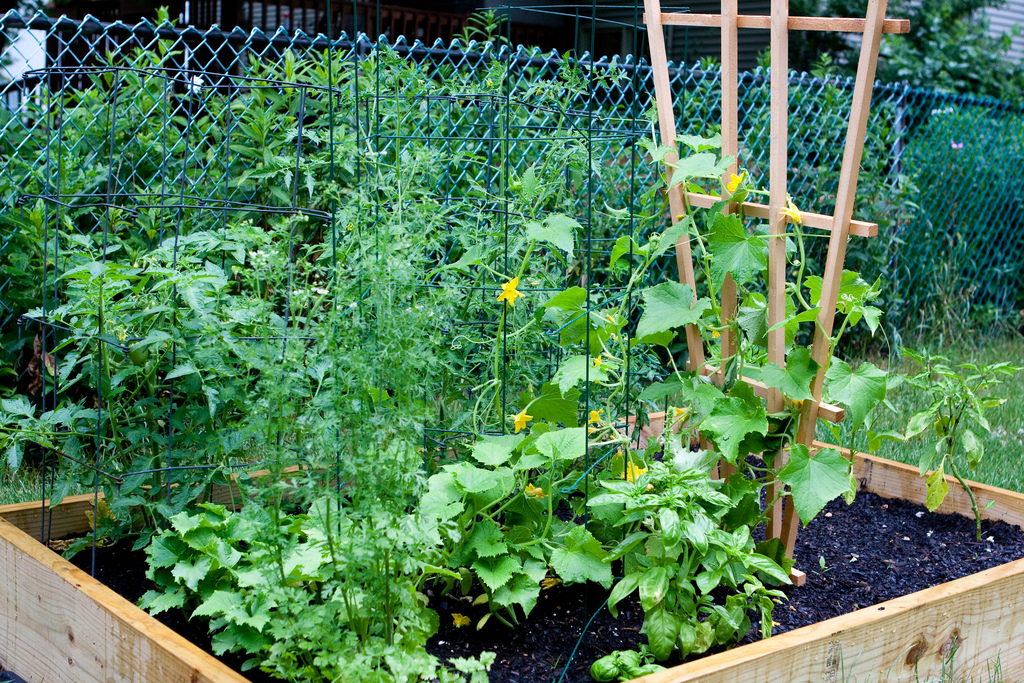
Philadelphia’s smelters are shut down, and cars no longer run on leaded gasoline. But the lead they released still clings to the soil surface, along with flakes of exterior lead paint. The result: lead is in the dirt that sticks to shoes and hands after work or play in bare soil. Lead is in the dust that the wind picks up and blows through open windows. (Lead paint is also a source of toxic dust.)
Children are most at risk of lead poisoning during early childhood, when lead dust is accidentally swallowed after normal hand-to-mouth behavior. Adults can inhale fine lead dust created by vigorous gardening, yard work, or home renovation without dust control.
Testing for lead
- Because both lead and its health effects are invisible, all children should be tested for lead before age one and again at age two. Ask your doctor.
- Resources for testing yard soil and house dust are listed at the end of this brochure.
Strategies for lead safety
- In the yard and neighborhood, cover bare soil and wet down dust on walks and porch.
- Keep lead-contaminated soil and dust out of your home. Less getting in means less to clean up. A bonus: Blocking lead dust also blocks pollen and other air pollutants that contribute to asthma.
Where to start: Powerfully protective habits
- Make a rule: Remove all shoes and boots at the door. This is the single most powerful way to reduce lead in house dust. Keep indoor shoes or slippers handy.
- Ban smoking in the house. Tobacco is a source of lead in both dust and children.
- Do not allow children or pets to play or dig in bare soil anywhere in the city, including parks. Walk dogs on leash or on grass, and consider keeping cats indoors. (Pets can be lead-poisoned too.)
- Before working or playing outdoors, wash your hands and your children’s hands with regular soap and water. Fine dust sticks tightly to the natural oils in skin, and washing can cut hand dust in half.
- After playing or working outdoors or on floors, wash hands (everyone!) before meals. Hand sanitizers do not remove lead.
- If your job or hobby exposes you to lead dust, change your clothes at work and bring them home in a plastic bag. Wash separately.
- Feed small children frequent, small, nutritious meals. A full stomach absorbs up to 90 percent less lead.
- Read, talk, sing to your child--engaging in irresistibly interesting activities with a loved adult actually helps the developing brain fight off lead.
Lead in soil and dust: cover it up, wet it down, keep it out, clean up what’s left
1. Cover it up:
- Cover bare soil with a lead-binding layer of compost followed by heavy, water-permeable landscape cloth. Cover the cloth with patio stones, six inches of mulch, or raised garden beds (see Resources). Pay special attention to the soil within 10 feet of painted house walls.
- Cover smaller bare spots—for example, under swings—with rubber mats.
- Engage your neighbors in a cover-the-bare-soil project. Neighborhood soil and dust control is known to increase lead safety for everyone.
2. Wet it down:
- In warm, dry weather, hose down your porch, sidewalk, and the adjacent street as well as any bare soil patches you see. Lead binds preferentially to the small soil particles that are picked up by a strong breeze.
- If you see nearby excavation or construction without dust control, close your windows and storm windows and notify your neighbors and Pennsylvania's Air Management Services (215-685-7580) or your local government.
3. Keep it out:
- If you cool with window fans, place a 2-inch pleated electrostatic air filter behind each fan to block both outdoor dust and paint dust in the window trough.
- For child safety, be sure to extend the sides of the fan firmly within the window track and lower the sash on the fan’s top.
- Change the filter when it gets dirty or if the fan motor slows.
- Place an exhaust fan in the north or northeast window of a separate room.
- If you have a central air (HVAC) system, ask your service technician about installing the thickest pleated electrostatic filter that will not interfere with air flow.
- If you have window air conditioners, try to place them in north or northeast windows, out of the prevailing wind. Because AC filters cannot capture the tiny dust particles that carry the most lead, consider setting a portable air cleaner nearby.
4. Clean up what’s left:
- Lead-safe cleaning has two special requirements: to avoid stirring up loose dust and to remove the super-fine dust that sticks tightly to surfaces.
- Vacuum carpets with either a sealed HEPA vacuum cleaner or a good household vacuum equipped with a HEPA filter. If possible, old threadbare carpets should be discarded or replaced. Worn spots can be covered with an area rug.
Stay Informed
Get the latest updates and actions:
Thanks for signing up!
There was a problem processing your signup. Please try again.